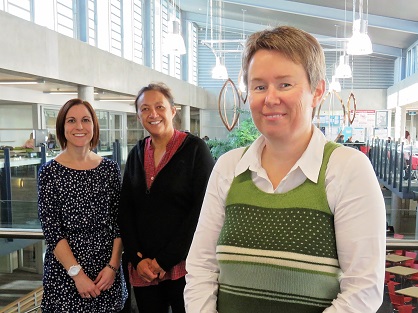
Co-investigators of a feasibility study about prescription charges include (from left) Alesha Smith, Shirley Keown and Pauline Norris. Missing is Simon Horsburgh, from Otago University's department of preventive and social medicine. (Photo credit: Rewa Pene)
“It's really, really good, it gives us a chance to work out if it would be possible to carry out a larger study around the effect of prescription charges on people's health…” Professor Pauline Norris
School of pharmacy staff have been successful in securing $150,000 from the Health Research Council of New Zealand to undertake a feasibility study about prescription charges.
Professor of social pharmacy Pauline Norris explains the funding will help them undertake a randomised controlled trial of prescription charges to investigate whether free prescriptions make a difference to people's health.
She is delighted to be successful in the funding round.
“It's really, really good, it gives us a chance to work out if it would be possible to carry out a larger study around the effect of prescription charges on people's health; and it allows us to get some preliminary investigations done before we apply for a larger grant.”
Professor Norris has been investigating the impact of prescription charges since they were raised from $3 to $5 in 2012. “There are people who struggle to pay the $5, it can be a barrier to them getting their medicines,” she explains.
Research undertaken by Professor Norris and her colleagues and published in the BMJ Open late last year shows that people's health can be harmed if they cannot afford prescriptions (Pharmacy Today, 8 December 2015).
For some people on low incomes, they sometimes have to go without their medicines, or without food or electricity so they can pay for their medicines.
Senior lecturer in clinical pharmacy, Alesha Smith, is a co-investigator for the feasibility study together with Otago University senior lecturer in epidemiology, Simon Horsburgh, and Shirley Keown, a manager for Gisborne Maori health provider, Turanga Health.
They plan to carry out an experiment whereby they recruit a group of people who have many health problems, who use a large number of medicines, struggle to pay for prescriptions and are likely to need more hospital care if they do not take their medicines.
They will divide the group in half – paying prescription charges for one group and comparing the group's use of health services to see whether free prescriptions make a difference.
Social pharmacy is a growing area of research within the school. Professor Norris was the inaugural professor of social pharmacy when she was appointed to the role in 2008.
The research focuses mainly on access to and use of medicines. As well as work within New Zealand, members of the social pharmacy research group have a strong interest in developing countries, particularly Nepal and Samoa, and are members of the Otago International Health Network.
Written by Liane Topham-Kindley for Pharmacy Today, August 2016
